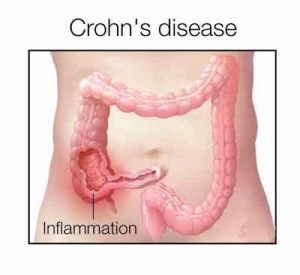- Home
- Editorial
- News
- Practice Guidelines
- Anesthesiology Guidelines
- Cancer Guidelines
- Cardiac Sciences Guidelines
- Critical Care Guidelines
- Dentistry Guidelines
- Dermatology Guidelines
- Diabetes and Endo Guidelines
- Diagnostics Guidelines
- ENT Guidelines
- Featured Practice Guidelines
- Gastroenterology Guidelines
- Geriatrics Guidelines
- Medicine Guidelines
- Nephrology Guidelines
- Neurosciences Guidelines
- Obs and Gynae Guidelines
- Ophthalmology Guidelines
- Orthopaedics Guidelines
- Paediatrics Guidelines
- Psychiatry Guidelines
- Pulmonology Guidelines
- Radiology Guidelines
- Surgery Guidelines
- Urology Guidelines
Humira administration within 2 years improves remission in Crohn's disease patients

Administration of adalimumab (Humira) within 2 years of diagnosis helps in substantial improvement of remission rates among Crohn's disease patients having poor prognostic factors at the time of diagnosis, according to a recent study presented at the Digestive Disease Week.
Real-world data on the effectiveness of anti-tumour necrosis factor agents on patients with Crohn’s disease bearing poor prognosis factors are scarce. Gerassimos Mantzaris, from the General Hospital of Athens in Greece, and colleagues conducted this multicenter, retrospective, chart-review study to determine how early initiation of Humira (adalimumab, AbbVie) in real-world evidence affects the 26-week clinical remission rate in patients with Crohn’s disease compared with delayed initiation of the drug.
For the purpose, the researchers enrolled 171 patients having moderate to severely active Crohn’s disease (HBI ≥ 8). These patients were naive to treatment with biologic therapy or exposed to biologic therapy at the start of therapy with adalimumab and had at least three poor prognosis factors at diagnosis, such as ileal or ileocolonic location, age 40 years or younger, active smoking, extensive and deep ulceration, severe rectal and/or perianal disease and upper gastrointestinal involvement. patients with Crohn’s disease-related intestinal resection before starting adalimumab were excluded.
Participants initiated adalimumab between July 1, 2007, and February 8, 2017.
Participants who had Crohn’s disease for less than 24 months before beginning adalimumab were grouped into the early cohort (n = 62; 36.3%) and those with a disease duration of more than 24 months before starting adalimumab were grouped into the delayed cohort (n = 109; 63.7%). At diagnosis, there was a median of three poor prognosis factors (range, 3 to 4) in each cohort.
Also Read: NICE 2019 Guidelines for management of Crohn’s disease
Key findings of the study include:
- 26-week HBI remission rates off steroids was 60.7% in the early cohort and 47.2% in the delayed cohorts.
- Among anti-TNF naive participants, the remission rate was 61.2% in the early cohort and 42.4% in the delayed cohort.
- The remission rate among anti-TNF experienced patients was 58.3% in the early cohort and 53.2% in the delayed cohort.
Also Read: Modern treatment of patient with Crohns Disease
“In patients with Crohn’s disease and poor prognosis factors, early initiation of adalimumab, within 2 years of diagnosis, achieves significantly higher remission rates compared with delayed introduction of adalimumab,” Mantzaris and colleagues wrote. “This effect is more prominent in biologic-naïve patients.”

Disclaimer: This site is primarily intended for healthcare professionals. Any content/information on this website does not replace the advice of medical and/or health professionals and should not be construed as medical/diagnostic advice/endorsement or prescription. Use of this site is subject to our terms of use, privacy policy, advertisement policy. © 2020 Minerva Medical Treatment Pvt Ltd